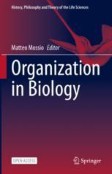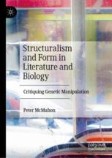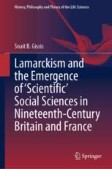Search
Search Results
-
Modeling Organogenesis from Biological First Principles
Unlike inert objects, organisms and their cells have the ability to initiate activity by themselves and thus change their properties or states even...
-
Minimal model explanations of cognition
Active materials are self-propelled non-living entities which, in some circumstances, exhibit a number of cognitively interesting behaviors such as...
-
Prague Structuralism and the Poetic Function
Structuralism has impacted the humanities and sciences, including biology. A limitation of structuralist models is their static nature. Saussure’s...
-
Environment
The term ‘environment’ is complex and conveys different meanings: the word ‘environment’ is employed as a synonym for space, territory, place, or...
-
Emergentism in the biological framework: the case of fitness
In this paper, I aim to explore whether fitness, understood as a causal disposition, can be characterized as an emergent property of organisms, or if...

-
Structuralism, Vitalism, and Bioengineering
Genetic manipulation (bioengineering) is implicit to the current paradigm of modern biology. Concerns raised about the technology have focused...
-
What Is Biological Normativity?
This essay focuses on two philosophical assumptions. According to the first one, biological normativity is not an irreducible property of the living,...
-
Arche-writing and data-production in theory-oriented scientific practice: the case of free-viewing as experimental system to test the temporal correlation hypothesis
Data production in experimental sciences depends on localised experimental systems, but the epistemic properties of data transcend the contingencies...

-
A dual proposal of minimal conditions for intentionality
Naturalist theories of representation have been attacked on the grounds of being too liberal on the minimal conditions for intentionality: they treat...
-
Standard aberration: cancer biology and the modeling account of normal function
Cancer biology features the ascription of normal functions to parts of cancers. At least some ascriptions of function in cancer biology track local...

-
Revolution Versus Evolution: The Pattern of Conceptual Change in Science
Scientific revolution is a widely known concept. But does revolution really occur in science? Change through revolution means that present thinking...
-
Biolinguistics and biological systems: a complex systems analysis of language
In their recent book, Ladyman and Wiesner (What is a complex system?, Yale University Press, 2020) delineate the bounds of the exciting...

-
Eating and Cognition in Two Animals without Neurons: Sponges and Trichoplax
Eating is a fundamental behavior in which all organisms must engage in order to procure the material and energy from their environment that they need...

-
Mechanism, autonomy and biological explanation
The new mechanists and the autonomy approach both aim to account for how biological phenomena are explained. One identifies appeals to how components...
-
Collective emotions and the distributed emotion framework
The main aim of this paper is to contribute to the development of the distributed emotion framework and to conceptualize collective emotions within...
-
Toward an Enactive Conception of Productive Practices: Beyond Material Agency
We examine the question of material agency as raised in material engagement theory (MET). Insofar as MET tends to highlight the causal roles played...

-
Is cultural evolution always fast? Challenging the idea that cognitive gadgets would be capable of rapid and adaptive evolution
Against the background of “arms race” style competitive explanations for complex human cognition, such as the Social Intelligence Hypothesis (Byrne...
-
Théodule Armand Ribot: ‘Scientific Psychology’ in France
Ribot fulfilled a controversial, seminal role in France: powerful long-time editor of the influential Revue philosophique, prolific author, high-brow...
-
Affordances and organizational functions
In this paper, we bring together the concepts of affordance from ecological psychology and function from the organizational approach to philosophy of...
-
The Human Condition at the Crossroads of Biology, Economy, and Ethics
Economy is not an abstract mathematical model: it cuts into the living flesh of the biologically evolved humans. In fact, if considered from a...
